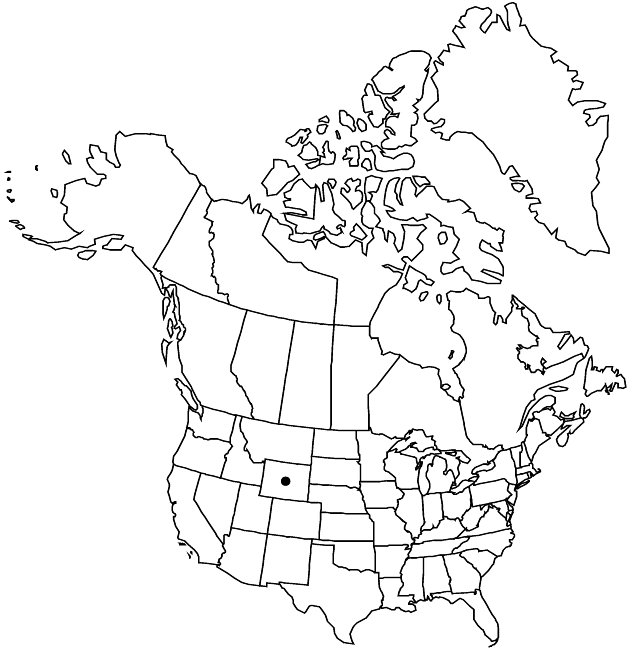Difference between revisions of "Pyrrocoma clementis var. villosa"
Phytologia 73: 57. 1992.
Endemic
Basionym: Pyrrocoma villosa Rydberg Bull. Torrey Bot. Club 27: 625. 1900
Treatment appears in FNA Volume 20. Treatment on page 416.
FNA>Volume Importer |
imported>Volume Importer |
||
| (6 intermediate revisions by 2 users not shown) | |||
| Line 7: | Line 7: | ||
|year=1992 | |year=1992 | ||
}} | }} | ||
| − | |basionyms={{Treatment/ID/ | + | |special_status={{Treatment/ID/Special_status |
| + | |code=E | ||
| + | |label=Endemic | ||
| + | }} | ||
| + | |basionyms={{Treatment/ID/Basionym | ||
|name=Pyrrocoma villosa | |name=Pyrrocoma villosa | ||
|authority=Rydberg | |authority=Rydberg | ||
| + | |rank=species | ||
| + | |publication_title=Bull. Torrey Bot. Club | ||
| + | |publication_place=27: 625. 1900 | ||
}} | }} | ||
|synonyms= | |synonyms= | ||
| Line 27: | Line 34: | ||
|distribution=Wyo. | |distribution=Wyo. | ||
|discussion=<p>Of conservation concern.</p><!-- | |discussion=<p>Of conservation concern.</p><!-- | ||
| − | --><p>Variety villosa is recognized mainly by its glabrous cypselae, lanceolate phyllaries, and geographic isolation. It is known primarily from the Big Horn Mountains in north-central Wyoming. The affinities of this poorly known taxon are obscure. It has been considered a distinct species or related to Pyrrocoma uniflora or P. integrifolia.</p> | + | --><p>Variety villosa is recognized mainly by its glabrous cypselae, lanceolate phyllaries, and geographic isolation. It is known primarily from the Big Horn Mountains in north-central Wyoming. The affinities of this poorly known taxon are obscure. It has been considered a distinct species or related to <i>Pyrrocoma uniflora</i> or <i>P. integrifolia</i>.</p> |
|tables= | |tables= | ||
|references= | |references= | ||
| Line 36: | Line 43: | ||
-->{{#Taxon: | -->{{#Taxon: | ||
name=Pyrrocoma clementis var. villosa | name=Pyrrocoma clementis var. villosa | ||
| − | |||
|authority=(Rydberg) Mayes ex G. K. Brown & D. J. Keil | |authority=(Rydberg) Mayes ex G. K. Brown & D. J. Keil | ||
|rank=variety | |rank=variety | ||
| Line 50: | Line 56: | ||
|publication title=Phytologia | |publication title=Phytologia | ||
|publication year=1992 | |publication year=1992 | ||
| − | |special status= | + | |special status=Endemic |
| − | |source xml=https:// | + | |source xml=https://bitbucket.org/aafc-mbb/fna-data-curation/src/2e0870ddd59836b60bcf96646a41e87ea5a5943a/coarse_grained_fna_xml/V19-20-21/V20_954.xml |
|tribe=Asteraceae tribe Astereae | |tribe=Asteraceae tribe Astereae | ||
|genus=Pyrrocoma | |genus=Pyrrocoma | ||
Latest revision as of 20:06, 5 November 2020
Plants 10–15 cm. Stems ascending. Leaves oblanceolate, 70–100 × 10–15 mm, margins entire or slightly denticulate. Involucres ca. 20 mm wide. Phyllaries narrowly lanceolate, apices attenuate. Cypsela faces glabrous.
Phenology: Flowering Jul–Aug.
Habitat: Openings in pine forest, above timberline in alpine meadows
Elevation: 2700–3500 m
Discussion
Of conservation concern.
Variety villosa is recognized mainly by its glabrous cypselae, lanceolate phyllaries, and geographic isolation. It is known primarily from the Big Horn Mountains in north-central Wyoming. The affinities of this poorly known taxon are obscure. It has been considered a distinct species or related to Pyrrocoma uniflora or P. integrifolia.
Selected References
None.
Lower Taxa
None.
